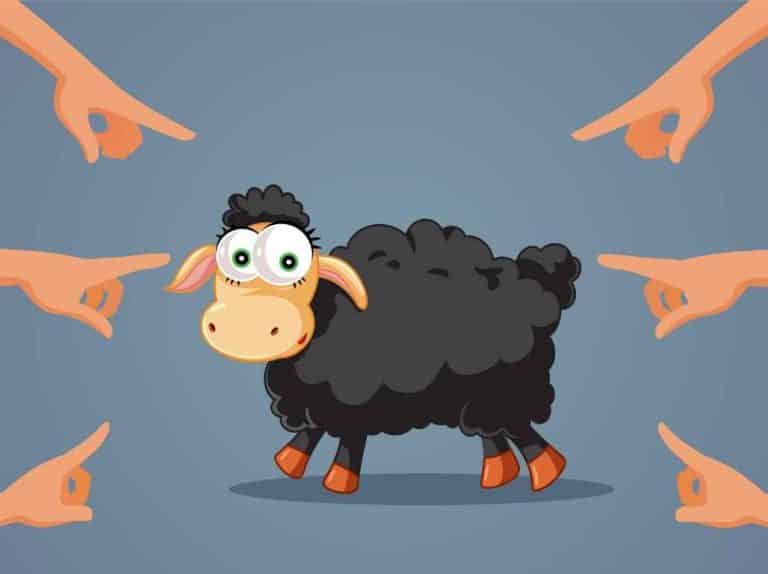If You Feel Unloved In Your Family You May Be The Family Scapegoat
Have you ever considered who is the family scapegoat in your family circle? Yes, many families focus on one person who others feel cause the problems. It’s easy to blame one family member to protect the others. Who is likable, and who causes the drama? Is there someone who insists on telling the truth when others are trying to hide it? What about narcissists and family members who are controlling or passive aggressive? There are lots of ways that family members can hurt each other. Family roles play a big part in determining who is the family scapegoat.
What Are Family Roles
Did you know that every family member has a role no matter whether your family is healthy and loving or dysfunctional? When you learn about family roles, you can be surprised. Are you the storyteller, the caretaker, the moody one? Some family members take on the difficult tasks. Some are considered the geniuses. If you’re the good girl, or the good boy, you will be treated differently from the so-called “wild” or “dumb” one.
Some family members are especially loved, and sadly some are not appreciated as they should be. Your role can be arbitrary, or based on other people’s secret hidden feelings that have nothing to do with you. No matter the reason, being the family scapegoat hurts.
What if You Are The Family Scapegoat
What if your family members blame all the family problems on you? What if you’re the one who’s left out? If have you have low self-esteem, depression, sadness, anxiety, you may be the family scapegoat. Are you a parent who always feels bad? What can you do about it? We always suggest getting help to understand what’s happening in your family and ways you can detach or take steps to heal yourself and feel better.
One kind of scapegoating that is difficult to manage occurs in families where there is substance or alcohol use disorders (addiction). Teen and adult addicts or alcoholics tend to blame their parents for everything that goes wrong. Parents are overwhelmed with the hate that comes their way. Here’s an example.
Alice Was Her Family Scapegoat
Alice P, an addict’s mom, wrote in to tell us about a liberating ‘aha’ moment she had about her painful relationship with her son Jimmy. Jimmy is an active substance abuser and extremely mean to her. There’s no nice way to put it.
The Family Scapegoat Is The Mom Who Tries To Help
“Since Jimmy started using, he lies a lot. I don’t know the truth about anything,” Alice told us, “and I felt horrible all the time. It was hard enough worrying that Jimmy would overdose and pass away, or hurt someone else while under the influence. But also it was extremely painful that he acts as if I am the one who abuses him and his problems are my fault because I don’t do enough to help him.”
Scapegoat Theory
Scapegoat theory refers to the tendency to blame someone else for one’s own problems, a process that often results in feelings of prejudice toward the person or group that one is blaming. Scapegoating serves as an opportunity to explain failure or misdeeds, while maintaining one’s positive self-image. If a person who is poor or doesn’t get a job that he or she applies for can blame an unfair system or the people who did get the job that he or she wanted, the person may be using the others as a scapegoat and may end up hating them as a result. Encyclopedia Social Psychology
Alice’s Enlightenment About The Family Scapegoat Role
“My therapist used the word scapegoat. She told me scapegoating is a kind of abuse. It certainly felt like Jimmy was beating me up for no reason, when I hadn’t done anything wrong. But if you don’t want someone to die, you will put up with a lot. The whole thing was confusing to say the least. Now I kind of get it. I don’t have to listen to him. My point of view matters.”
Getting Help Was The Key To Her Recovery
Alice went on to say she is not the kind of person who ever looked to therapy for answers, or used facebook sites to vent her frustration, and she had not thought about trying Al-Anon, which is free and could also help her. But life with an active addict aged 22 and living at home felt like it was killing her. “I needed another point of view to help me accept that I was the one who had to change,” Alice told me.
Blame Shifting Is Responsibility Shifting
We know a lot of people find it difficult to ask for help. Alone, however, it can be too difficult to identify what about your relationships is causing so much pain. When Jimmy pins his problems on his mom, he doesn’t have to take responsibility for himself. He doesn’t even have to be reasonable. It’s her fault. If she buys his argument, she’s allowing herself to be both used and abused.
When she tries to hold him accountable, he’s likely to get even madder. Anyone who’s scapegoated by a family member, lover, or co-worker, cannot win no matter what they say or do. A therapist can help identify what’s going on. Here are some resources for you to explore to get information and help. And check out online therapy.
More Articles To Read About Family Relationships
3 Tips To Calm Mom’s Codependent Relationship Woes
9 Tips for Healthy Family Relationships This Summer
The Toxic Tango of Codependency





















